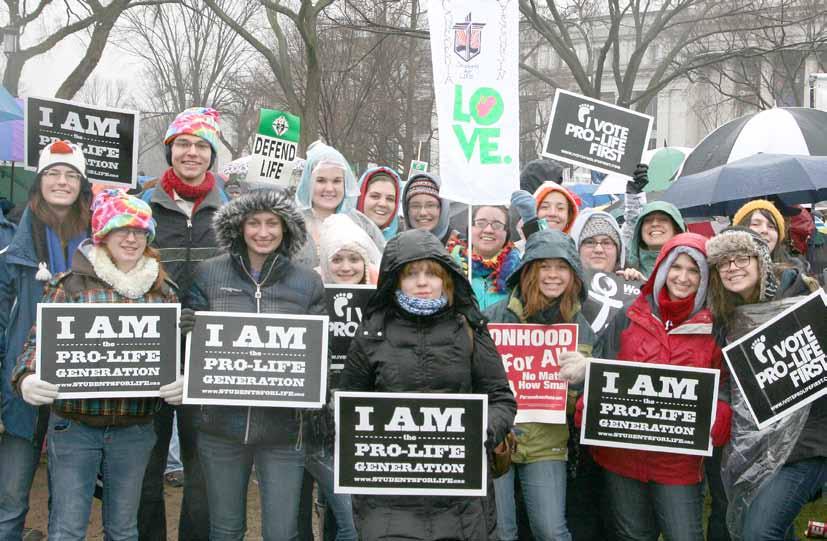
3 minute read
Christian Activism?
By Maggie Karner
I vividly remember my first time in the voting booth. Even to this day I still get a little choked up with patriotism as I wait in line to vote every Election Day. Like me, most Christians understand the blessing of our representative form of government and exercise their God-given responsibility as citizens to vote. But many Christians feel there should be a clear separation between their secular life and their Christian life. They were told never to discuss the controversial topics of religion or politics at the dinner table and, if one was socially considerate, never to tackle the two topics together. They see passages such as John 17:16 and Romans 12:2, which tell us that Christians are in this world, but not of this world, as a signal that Christians, and likewise the Church, need to butt out of the public arena. In light of these passages, what role, if any, should the Church and individuals play in the political arena?
Advertisement
Dr. Robert Benne, author and Director of the Roanoke College Center for Religion and Society, argues in his book Good and Bad Ways to Think About Religion and Politics, that our founding fathers determined that the free exercise of religion was our “first freedom” because they recognized that true and active religious practice would shape our culture with good morals and virtuous citizens. In fact, this “free exercise” has been a catalyst for Christian activism throughout American history; religiously motivated people and churches fueled the fight for the abolition of slavery, the Civil Rights Act of 1964, and our contemporary pro-life movement.
In today’s society, Christians are faced with serious issues that require our utmost attention— and sometimes our activism. Unfortunately, our government has created legislation that threatens the church’s ability to preach the Gospel. Consider the following: 1) The repeal of “Don’t ask, Don’t Tell” puts our military chaplains in difficult positions. 2) The U.S. Department of Justice is refusing to uphold DOMA (the Defense of Marriage Act, a U.S. federal law that defines marriage as between one man and one woman). 3) Religious organizations and employers are being forced to comply with a U.S. Health and Human Services mandate on supplying abortifacient contraceptives to employees or face a steep fine if they refuse. If the church doesn’t speak out on these issues today, we may not have the ability to do so tomorrow.

Martin Luther brought a unique clarity to this discussion which was just as volatile a topic in his world as it is today. As both a theologian and a student of the law, Luther was uniquely qualified to understand and explain God’s providential purpose for both the secular and the religious functions of our society through his doctrine of the two kingdoms (or realms). Luther explained that God works through the kingdom of the left (or civic and government functions) to maintain civil order and a just society so that the kingdom of the right (the body of Christ and His church) can operate more effectively in a free society where the freedom to proclaim the Gospel is maintained. Likewise, when the Church is given the freedom to demonstrate Christian compassion toward our neighbor (mercy work), it supports and promotes a just and effective social society.
This teaching stands in sharp contrast to other Christian groups who either shun civic work altogether or believe that their purpose is to “Christianize” our government and political system. To the contrary, Luther says that we should not confuse the two kingdoms and that each kingdom has been ordained by God for a specific purpose on earth.
So can a Lutheran Christian be active in both kingdoms? “Absolutely,” says Rev. Bart Day, Executive Director of LCMS Office of National Mission, “as long as we recognize and understand within which kingdom we are working.” He notes that the Scriptures speak clearly on moral issues, which fall under the left-hand kingdom of the law. Civil society and the government should help put parameters on morality in a civil society. However, in a sinful world our society often fails to do so. Abortion, euthanasia and same-sex marriage are examples. The church encounters these questions frequently and must have the freedom to speak on them within the church and society. Pastor Day explains that when politics shape and form or change the moral fiber and ethos of the society in which the church lives, then the church has a clear responsibility to speak out.
In fact, Luther would advocate for Christians to be very involved in the moral discussions found within the civic realm. “Though we be active in the battle,” Luther said, “if we are not fighting where the battle is the hottest, we are traitors to the cause.” He understood that Christians must exercise bold leadership in bringing about a just and compassionate order to society. Luther recognized that in such a moral and just society, the church is best able to provide mercy and care for our neighbor and enjoy the freedom to preach the saving and forgiving Gospel of the forgiveness of sins for Jesus’ sake. To be sure, both of these can be done when the culture is hostile to Christ’s church, but it is a great joy and blessing when the church can do so in peace.
Maggie Karner is the Director of Life and Health Ministries at the Lutheran Church—Missouri Synod. Her work with the LCMS involves directing the church body’s strategy for international and national health and pro-life projects.She can be reached at maggie.karner@lcms.org










